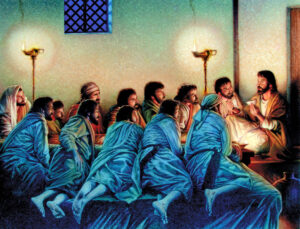Daily Lesson for Monday 9th of September 2024
Read Mark 14:22-31 and Exodus 24:8. What great significance to the Christian faith is found in this account?
Mark 14:12 notes that this is the first day of unleavened bread, when the Passover lamb was sacrificed. The meal was on Thursday evening.
At the Last Supper, Jesus institutes a new memorial service. It is a transition from the Jewish Passover celebration and is directly linked to Israel’s leaving Egypt and becoming God’s covenant people at Sinai. In the sealing of the covenant, in Exodus 24:8, Moses sprinkles the people with the blood of the sacrifices and says, “ ‘Behold the blood of the covenant that the Lord has made with you in accordance with all these words’ ” (ESV).
It is striking that in the Lord’s Supper, which Jesus institutes here, no use is made of the lamb of the Passover meal. That is because Jesus is the Lamb of God (compare with John 1:29). The bread of the Lord’s Supper represents His body. The new covenant (compare with Jeremiah 31:31-34) is sealed with the blood of Jesus, and the cup represents this. He says, “ ‘This is my blood of the covenant, which is poured out for many’ ” (Mark 14:24, ESV).
Then, amid all this, Jesus predicts that His disciples will all abandon Him. He cites Zechariah 13:7, which speaks of the sword striking the shepherd and the sheep being scattered. Jesus is the shepherd, and His disciples are the sheep. It is a stark and depressing message. But Jesus adds a word of hope, repeating the prediction of His resurrection. But He adds that He will go before the disciples to Galilee. That prediction will be referred to by the young man at Jesus’ tomb, in Mark 16:7, and thus it carries special weight here.
But all this is too hard for the disciples to accept, especially Peter, who argues that everyone else may fall away, but he will not. However, Jesus continues with the solemn language and predicts that Peter will deny Him three times before the rooster crows twice. The prediction will play a crucial role in the scene of Jesus’ trial and Peter’s denial; so, it also plays a crucial role here.
|
What can you learn from whatever times you promised God that you would or would not do something and ended up doing or not doing it anyway? |
 (1)
(1)



